Last updated on 6 April 2025
Please note if you are using DSM7.2 or higher you should use the Container Manager version of this guide from the menu.
If you are still using an older DSM version migrate to Dockge and you can use my new guides!
See the Dockge guide here to start migration!
This guide has reached the end of its updates
| Update | Date |
|---|---|
| Amended the path to save the compose file – this is for security, so the container has no access to the file contents. | 14/04/2023 |
What is SABnzbd?
SABnzbd is a binary newsreader, it is used to download files from Usenet, and where required will also repair and extract releases. It works on its own or in conjunction with other tools such as Lidarr and Radarr.
Let’s Begin
In this guide I will take you through the steps to get SABnzbd up and running in Docker.
In order for you to successfully use this guide please complete the three preceding guides
- Step 1: Directory Setup Guide
- Step 2: Setting up a restricted Docker user
- Step 3: Setting up a Docker Bridge Network
Downloading the SABnzbd Image
Open up Docker within DSM and navigate to the ‘Registry’ tab and search for ‘SABnzbd’.
In the list of available containers select the one made by Linuxserver as shown below, right click on it and select ‘Download’ or click the button at the top of the window.

The pop-up box will ask which version you want to download, make sure you choose ‘Latest’ from the list of available versions.

You can check the status of the download over on the ‘Image’ tab.
Setting up the container
In Docker click on the ‘Image’ tab, in the list of your containers select the ‘Linuxserver SABnzbd’ image and click on ‘Launch’
You will be greeted with the Network screen, we will be using the ‘synobridge’ network we created earlier select it from the list and click Next.
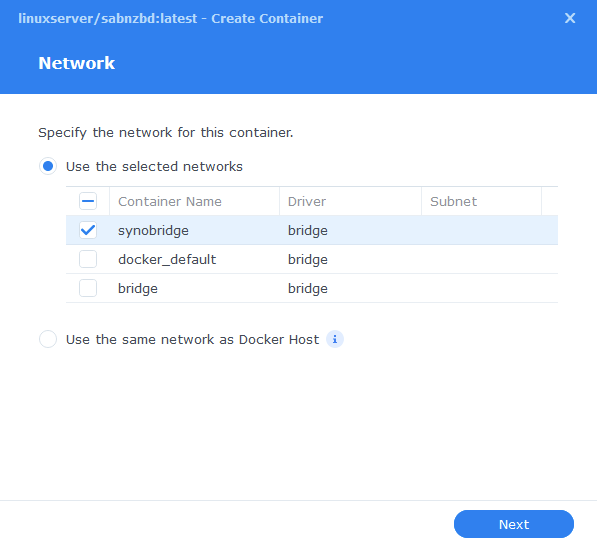
General Settings
Next you will be greeted with the General Settings screen, this is where you can start specifying some of your preferences.
You can change the name of the container to anything you like, and you may want to enable Auto Restart as this will ensure SABnzbd starts automatically if you reboot your NAS.

Next up we are going to click on the ‘Advanced Settings’ button, this will take you to a new window with a number of tabs which we are going to work through.
Environment (PGID, PUID and Timezone)
Next we are going to set up a couple of environment variables that docker will use to allow the container access to our files and folders and also to tell it where we live in the world.
Click the Add button, and fill in the following details as per the table/screenshot, you will need to do one at a time.
| Variable | Value |
|---|---|
| PUID | The UID you obtained in the user setup guide |
| PGID | The GID you obtained in the user setup guide |
| TZ | Your timezone wikipedia.org/wiki/List_of_tz_database_time_zones |

Links/Execution Commands
You do not need to set up anything on these tabs.
Press ‘Save’ to go back to the initial setup screen, then press ‘Next’
Port Settings
We won’t be changing any of the ports the container uses. You can repeat the ones shown on the right side of the settings page ‘Container Port’ onto the left side ‘Local Port’ once you have done this press ‘Next’.
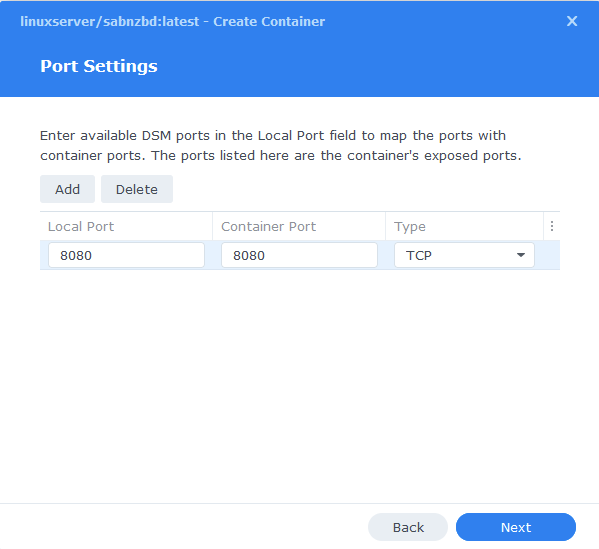
Volume Settings
We will now be specifying the directories where SABnzbd will store its configuration files and where download files.
Click on Add Folder, click on the docker share and create a new sub-folder called ‘sabnzbd’ select this folder and click ‘select’

You will now repeat this step but this time adding the /data/usenet folder and then add the Mount Paths as per the table / screenshot below.
| File/Folder | Mount path |
|---|---|
| docker/sabnzbd | /config |
| data/usenet | /data/usenet |

Click Next to move to the final screen.
Summary
You have now completed the setup of the container.
You will be shown an overall summary of the settings we have specified, this is a good time to double-check everything is correct. Finally, click on Done and the container should start to boot.
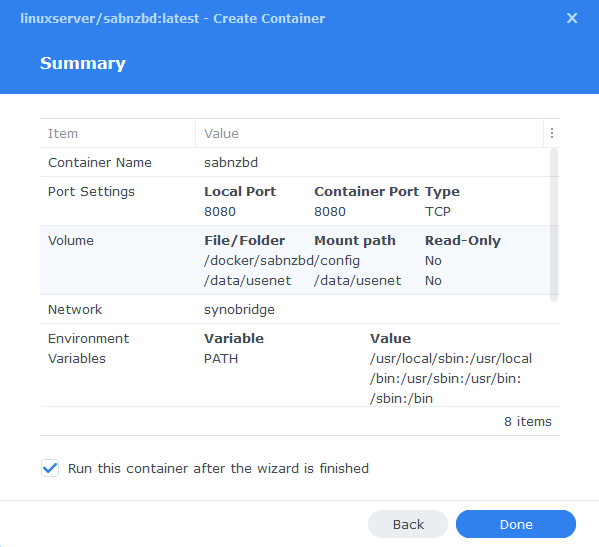
Some final steps
SABnzbd will now be running on port 8080 you can connect to it by going to the IP address of your NAS with that port
e.g. 192.168.0.40:8080
Once you have completed the setup wizard, go into the settings and amend your folders to the following
(Please note, if you have trouble accessing the setup wizard or get an error after the first step. Stop the Docker package in the Package Centre and restart it, or in some cases do a reboot)
After the initial set up you will need to ensure the ‘Folders’ settings are in line with the table/screenshot below.
| Setting | Path |
|---|---|
| Temporary Download Folder | /data/usenet/intermediate |
| Completed Download Folder | /data/usenet/completed |
| Watched Folder | /data/usenet/nzb |
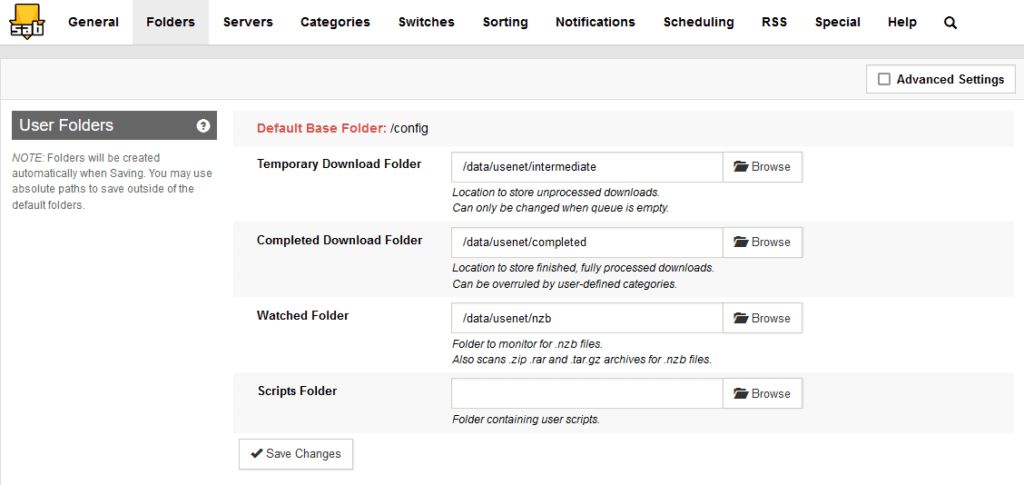
| Historic Updates | Date |
|---|---|
| Added Docker Compose details Added new folder mappings to ensure atomic moves and Hard-linking | 03/05/2021 |
| Guide re-written and updated with DSM7 screenshots | 01/08/2021 |
| Added note about rebooting if you are unable to access the Setup Wizard | 14/01/2022 |
| Updated steps and screenshots for DSM7.1 | 02/07/2022 |
| Added new port settings and Docker Bridge Network | 24/07/2022 |
| Compose version number removed and small wording amendments | 08/04/2023 |
Looking for some help, join our Discord community
If you are struggling with any steps in the guides or looking to branch out into other containers join our Discord community!
Buy me a beverage!
If you have found my site useful please consider pinging me a tip as it helps cover the cost of running things or just lets me stay hydrated. Plus 10% goes to the devs of the apps I do guides for every year.
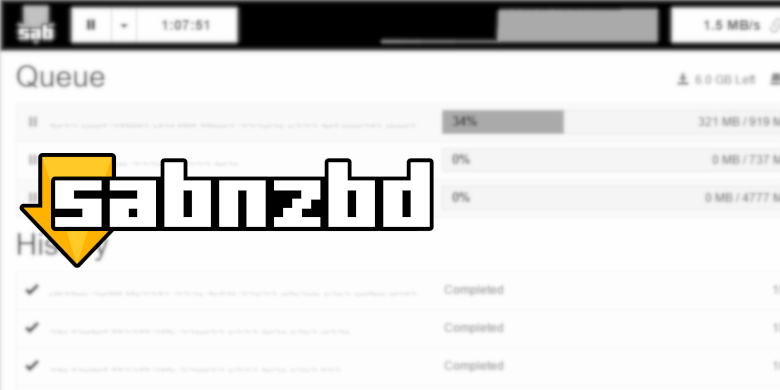



Greetings Doc…thanks for taking the time to provide these comprehensive guides…easy enough for even a ludite like me to follow.
I’ve now completed the first three guides on initial setup, updating containers and media management. Sabnzbd appears to have installed properly and launches…however, upon entering the Server host name, username and password, I’m getting an error when testing the server.
I know the details to be correct as they work when using an instance of Sab with same details on a MAC…
Error shown is:
[Errno 99] Address not available
Check for internet or DNS problems…
Fully baffled.
Respectfully seeking any insight or assistance you may be able to render.
Thanks
Hey, glad the guides are useful . Do the other containers you have set up such as Sonarr have Internet access. Best way to test this is just try adding a series or movie and see if it finds the details. If not I would suggest doing a reboot and report back.
Hello Doc…thanks for coming back so quickly…so…I’ve not got the ‘ARRS’ installed via your guide yet…just Plex and Sabnzbd so far.
I’ve not yet run plex as I am looking to get my architecture set up right which is nearly done…based on your guide…data/media etc etc.
What i did do though, was also contact usenet support and ask about the error code and they suggested it may be an issue with Synology DNS info requiring a clear out. They didn’t however, advise how (and i wouldn’t have expected that being as they’re not Syno support).
I’ve had a look through the control panel and taking this action is not immediately obvious to me…any ideas?
Much appreciated.
Have you just tried a reboot at all (also do you have the Firewall turned on)
He there, new to the whole NAS thing… but, just ordered a nice 220+
I’m not new to SABnzbd, so I am curious what makes the above different if I want to use a port that I used to use for a windows maching?
Hi, Thanks for the guides! Got Plex, sonarr, radarr, sab all going a few weeks back.
But now all are saying a new version is available and clicking update I dont think will work in Docker – do I need to stop and delete the old image, then run it all again to update? Assuming it wont overwrite my settings, Plex libraries in particular.
Sorry, I just found the article you wrote answering this very question. I’ll sling you some coffees!!
So far so good! Looks like sab is up and running. Tomorrow sonarr and radarr and then test working with Plex (-:
Great tutorials by the way. Tried following the TraSh things but that went nowhere fast. This is plain and easy to follow!
Good to hear, any issues reach out via discord or the contact page 🙂
Very nice , many thanks, works like a charm !